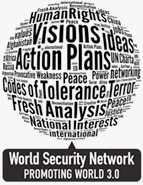Codes of Tolerance for Policy Makers on the local, national and international Levels

O According to the UN and Human Rights Charta and the UN Year of Tolerance 1995 and the UN Culture of Peace Declarations from November 2008 the policy makers in the world have not the choice but the international obligation to promote tolerance and respect towards other religions, races and ethnic minorities. On the other side citizens of other religion or minority in all of the 192 states on the global have the rights to demand respect. Unfortunally many states and politicians still disregard these obligations on the local, national and international level and discriminate other religions, races and ethnic minorities.
O “No tolerance to intolerance!” policy in all countries of the world needed.
O To implement and active these international obligations politicians should actively promote tolerance and respect by several actions in their countries on the local and national level:
- The establishment of a governmental position of State Secretary or Special Representative for Dialogue of Cultures and Tolerance, with a budget (similar to the environmental and arms control initiatives of the 1970s and 1980s.)
- Legislative resolutions requiring governments to publish an Annual Report on the Status of the Dialogue of Cultures, Tolerance, and Peaceful Coexistence.
- A national or local Day of Tolerance and Minorities.
- Implementing the Codes of Tolerance and Respect for education in school systems.
- Establish a Truth and Reconciliation Commission like that in South Africa by the National Unity and Reconciliation Act of 1995 to “enable South Africans to come to terms with their past on a morally accepted basis and to advance the cause of reconciliations,” (Mr. Dullah Omar, former Minister of Justice) including three committees on Amnesty, Reparation and Rehabilitation and Human Rights Violation.
- Special discussions at international conferences and organizations like OSCE in Vienna and the Middle East Forum of the EU, or the UN and UNESCO revitalizing the universal UN concepts of tolerance.
- An invitation to representatives of national minorities to an official dinner with the Mayor, Governor, or national President along with members of the press.
- Reconstruction of symbolic buildings or other landmarks as a sign of reconciliation through donations provided by countries who destroyed them in the past, for example, the “Frauenkirche” (Church of Our Lady) in Dresden or the world-famous Bridge of Mostar.
- Agreements to allow other religions to build churches, mosque and synagogues even when they are in a minority like done in Dohar (Qatar) or in Cologne and Duisburg in Germany.







Comments